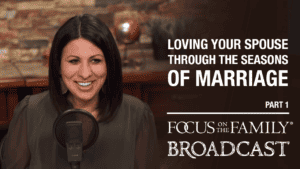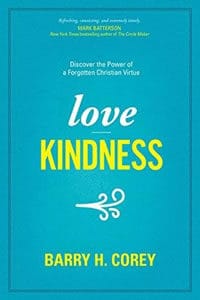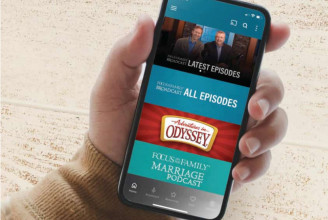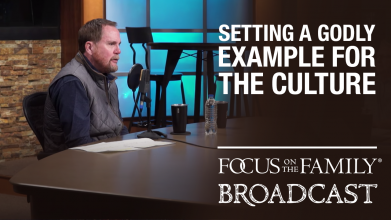Excerpt:
Dr. Barry Corey: It’s easy to be nice to the barista right when, when she gets your coffee right.
Jim Daly: (laughs)
Dr. Barry: It’s easy to be kind when there’s harmony in your family. But try kindness when there’s dissension. Try kindness when you have a strained relationship with your husband, with your children. Try kindness when you’re not getting along with your neighbor. It’s a lot more difficult.
End of Excerpt
John Fuller: That’s Dr. Barry Corey, the President of Biola University. And he’s with us today on Focus on the Family. Your host is Focus president and author Jim Daly. I’m John Fuller. And of course, here in the US, it’s Inauguration Day. And our country formally swears in a new president for office. Jim, um, this has been, and this will be an understatement, an extraordinarily difficult political season for all of us.
Jim: Well, the political division in this country has become as contentious as I’ve ever seen it. And in the past couple of years, uh, and really the past couple of decades, things have continued building to this fever pitch. And it’s heartbreaking to see such anger on both sides of our divided country. And I know that God’s heart is breaking as well. Uh, many people now have strained relationships within their own family, uh, family or even co-workers as a result of the outcome of the elections. So, I, I felt that it would be timely today to take a break here in Sanctity of Human Life week and talk about the issue of kindness. It’s one of the traits, one of the fruits of the spirit that God gives us. And regardless of what’s happening around us, we should still, um, certainly show kindness to one another. And I’m really looking forward to the conversation today because it will help us learn how we can better love God and love people, and to live out the Scripture in Micah 6:8, which says, “He has told you, oh man, what is good and what does the Lord require of you, but to do justice and to love kindness and to walk humbly with your God.” And I think that’s an awesome statement. So often, uh, we’re missing those admonitions to project kindness, but when we show kindness to others, uh, somehow what I’ve experienced, is it opens their heart up.
John: Mm-hmm (affirmative). Yeah, it’s kind of a lost art, but a, a great reminder today, uh, in the conversation ahead, we do have some ways for you to learn more about doing that. And, uh, and this note that you’ll find a lot of resources to encourage you along the way at focusonthefamily.com/broadcast. And we’re coming back to a visit we had just a few years ago with Dr. Barry Corey, who’s been the President of Biola University since 2007. He’s written a couple of books including Love Kindness. And he and his wife, Paula, live in Southern California, and have three children.
Jim: Dr. Corey, uh, Barry to your friends. (laughs)
Barry: Thank you.
Jim: And it’s great, great to have you here in Focus.
Barry: Great to be here, Jim and John. Thanks for having me on this show.
Jim: Now, you and I have ha- had many discussions about this theme-
Barry: Mm-hmm (affirmative).
Jim: … about love and kindness and those virtues that sometimes get lost in the fray of battle, (laughs) if we wanna call it, the spiritual warfare.
Barry: Right, right. Yeah.
Jim: Um, describe for me, uh, where you’re coming from.
Barry: Mm-hmm (affirmative).
Jim: What kindness is in that true definition? And why you believe, uh, we need to re-emphasize it?
Barry: Yeah, well, you know, I remember the very first time I met you, uh, Jim, uh, at Biola years ago. We immediately started talking about how can we be more civil in an increasingly uncivil, uh, culture. And, um, those conversations continue to, to kind of germinate in my, in my mind and in my heart. And as I’m looking at this rising generation of students and like, “What are we modeling for them in a way that they’re gonna have an impact on our culture, in, in politics, in entertainment, in the arts and commerce, whatever it might be?” And increasingly, I believe that the antidote to all of the division and the skepticism and the anger and the polarization is to… for Christians to lead the way and living lives of profound kindness. It is what, uh, you mentioned though, that Micah 6:8 verse that we are called to… We say love mercy sometimes, but it literally means to love kindness, not just to do kindness in some Nike-esque kind of way. (laughing) We don’t do kindness. We love kindness. And that means kindness is not a random act, it’s a radical life. And this book that I wrote is about how revolutionary our lives could be in our families, in our communities, in our neighborhoods, in our culture, in our politics if we lived out this profound sense of kindness that the Scriptures call us to.
Jim: W- why is love and kindness, and I, I put those together because usually, when you’re looking at the fruit of the Spirit, right, in Galatians, uh, 5:22-
Barry: Mm-hmm (affirmative). Mm-hmm (affirmative).
Jim: … it’s, it’s love, joy, peace, goodness, kindness, mercy.
Barry: Right, yeah.
Jim: Um, why did these things get lost? I mean, why do we acknowledge them almost with our head-
Barry: Right.
Jim: … but sometimes they’re hard to deploy with our heart because there’s that fight in us.
Barry: Mm-hmm (affirmative).
Jim: We don’t want to see injustice, we don’t wanna see things go against the Word of God-
Barry: Right.
Jim: … especially in a country that has historically embraced Christian values. And now things are changing. And we’re in an environment where we don’t have that-
Barry: Mm-hmm (affirmative).
Jim: … um, singular social cohesive approach.
Barry: Mm-hmm (affirmative).
Jim: Um, w- (laughs) why does the ugly side of us-
Barry: Hmm. Yeah.
Jim: … show up rather than the God’s Spirit in us, that love and kindness that he possesses?
Barry: Yeah. You know, I’ve been using a phrase recently about, um, living a life with a firm center and soft edges. And too often, I think Christians have had firm centers and hard edges. We’ve got to stand up for this, and we’ve got to defend ourselves. And so the hard edges is… are, are what we lead with, or we think that, well, if you have soft edges, that means you have, you have a spongy center, that you don’t really have any firm convictions or beliefs. But if you look at the fruit of the Spirit, some… and kindness is right there right in the middle. And I think it is, it is, you know, one of the keys… It’s not a gift of spirit. Like it’s not optional. You have to live this way if you are a follower of Jesus. That we somehow mistake kindness for niceness.
Jim: What’s the difference?
Barry: Well, I think niceness is spongy in the middle-
Jim: Yeah. (laughs)
Barry: … and kindness is radical and powerful. You can’t find the word niceness or nice in the Bible, nowhere.
Jim: Hmm.
Barry: It’s not there. But kindness is all over it: Old Testament, New Testament. Scriptures are full of the word kindness, loving, kindness, kindhearted. Um, and a matter of fact, uh, Paul in, in Romans 2:4 says, “It’s kindness that leads to repentance.”
Jim: Right.
Barry: And he di- he, he says it right after this… the… all the words about judging. Don’t be overly judgmental. And, and sometimes we think judgment is what changes it. And so we’re quick to judge, and quick to be angry, and quick to be combative. And because we think kindness is too soft, it’s what Boy Scouts and grandmothers do. We need to stop telling our children to be nice and start telling them to be kind, and then tell them the difference between the two.
Jim: Now I like that. In fact, that Romans 2:4 verse is something I quote often. And it’s not just, uh, you know for us, but it says, “God’s kindness leads one to repentance.”
Barry: Mm-hmm (affirmative). Right.
Jim: So the question that I always ask people that are, uh, struggling with that kindness idea is w- why should we do something different from what God does with sinners?
Barry: Right.
Jim: And us i- included.
Barry: Yeah, yeah.
Jim: You know, he doesn’t just, uh, come at us simply with that judgment. I mean, i- i- being righteous is part of the package.
Barry: Mm-hmm (affirmative).
Jim: And that’s where we wanna go with sanctification.
Barry: Yeah. Mm-hmm (affirmative).
Jim: But he starts the process by-
Barry: Yeah. Yeah.
Jim: … expressing his kindness toward us. And that’s what leads us to repentance. So, I’ll often ask a crowd, who’s been beaten into the kingdom of God? I’d like to see your hand.
Barry: Right.
Jim: Who has said here, “Those Christians were so tough on me.”
Barry: Yeah, yeah.
Jim: “And were so hateful toward me that I decided to become one of them.”
Barry: Yeah. Right.
Jim: You never find anybody like that.
Barry: No. Yeah.
Jim: It’s always, “These Christians showed me such love and such kindness. It compelled me to kind of open my heart up to the message of God.”
Barry: Right. Mm-hmm (affirmative). Yeah. Yeah.
Jim: That’s what happens, isn’t it?
Barry: That’s what happens. And I think we often assume that the opposite of kindness is meanness. And, and I don’t think that’s the case. I think the opposite of kindness is fear.
Jim: Hmm.
Barry: We’re afraid of the, the Supreme Court. We’re afraid of the President. We’re afraid of the immigrant, we’re afraid of the Muslim, we’re afraid of the gay person, whatever it might be. And so because of that fear, we put up barriers. And those barriers become obstacles for our building relationships with those who may not see eye to eye with us.
Jim: Yeah.
Barry: And, and that’s what Scripture calls us to do when it me- when it says love kindness. You, you reach out to those who… It’s easy to be nice to the barista, right, when, when she gets your coffee right.
Jim: (laughs)
Barry: It’s easy to be kind when there’s harmony in your family. But try kindness when there’s dissension, try kindness when you have a strained relationship with your husband or your children, try kindness when you’re not getting along with your neighbor. It’s a lot more difficult then. And what’s most offensive to us in our human side sometimes is when, uh, we- we’re kind and we’re not thanked, we’re kind and we’re not received. But kindness is not about being thanked, kindness is about being obedient. And sometimes, you’re gonna get the cold shoulder or the fist or the finger or whatever it might be, and that doesn’t matter.
Jim: Or verbal attack with… yeah.
Barry: Or verbal attack.
Jim: But let me ask you this. Uh, you were a Rhodes Scholar, which congratulations [crosstalk 00:09:18].
Barry: Uh, Fulbright.
Jim: Fulbright.
Barry: Yeah, yeah.
Jim: And that is an achievement. I mean that is really something.
Barry: Mm-hmm (affirmative).
Jim: While you’re overseas, your dad who, uh, was a pastor-
Barry: Yeah.
Jim: … uh, he passed away not long ago, I think.
Barry: Right.
Jim: But he came to visit you, and you had quite a discussion with him.
Barry: Mm-hmm (affirmative). Yes.
Jim: Tell us about how he modeled kindness for you, and what you saw in your own father.
Barry: So when I was a child, um, my father who had this profound love for Jesus and lived his life of unfiltered kindness even when people rejected him, he would do the most, in my mind, the most awkward things. He would hug the Islamic gas station attendant. He would hold hands with a cobbler, fixing his shoes at the little shoe place and pray with him. One time, he had the, the, the audacity to hold the Jewish furniture merchant’s face in his hand and, and say, “Reuben, I love you.” And I wanted to crawl under the, the desk of that furniture shop because I was so mortified.
Jim: (laughs)
Barry: My father would actually do that. But it was years later when I was this pony-tailed researcher living in Bangladesh for a year-
Jim: (laughs)
Barry: … that he came through for a few days. And we had this walk this one morning on these [inaudible 00:10:20] streets of Dhaka, the nation’s capital, which is crowded with rickshaws and beggars and poverty and stench. And as we were walking these streets, and I was trying to figure life out. He said, “There’s a verse in Matthew chapter 10.” He said, “I, I, I can’t get out of my mind.” He said, “It’s right after Jesus says to His disciples, ‘If you wanna be my follower, you pick up your cross and come with me.’ But then he says to His disciples, ‘Whoever receives you receives me. And whoever receives me receives the one who sent me,’” Matthew 10:40. He said, “I don’t fully get what Jesus meant, but this I do know that whoever God places in my path, unless I make myself receivable to them, how will they ever receive the grace of God? How will they ever receive the love of Christ?” And, and at that moment, all those memories began cascading down of the Islamic gas station attendant and the cobbler and the Jewish furniture merchant. And I, and I understood, you know, my father wasn’t being weird. He was, he was being receivable.
Jim: Yeah.
Barry: And he was living that life of, you know, “What- whatever it takes, I’m gonna make myself receivable.” And to me, receivable looks like kindness. But you may not be accepted with your kindness. Uh, you may be rejected. But, but kindness is never forgotten. There’s something powerful about kindness and the, and the seeds of kindness that you plant. You may not see the, the result of those seeds for years or maybe even an eternity.
Jim: Right.
Barry: But you’ve got to lean into kindness even when it seems offensive to people, even when you’re rejected.
Jim: Well, and, Barry, what strikes me is how it is God’s tool.
Barry: Mm-hmm (affirmative).
Jim: I mean I think that’s why he says, “Love your neighbor.”
Barry: Yeah, right. Yeah. Yeah.
Jim: Because it does something to that neighbor’s heart, especially, if, if they’re at odds with you for some reason.
Barry: Hmm. Right.
Jim: It’s that soft edges you talked about. Uh, y- you talked also in the book about the, the, the pain caused by hypocrisy.
Barry: Hmm.
Jim: And of course, we have that in our culture all the time.
Barry: Mm-hmm (affirmative).
Jim: You’re working as a college president at Biola.
Barry: Mm-hmm (affirmative).
Jim: You have that rising generation with you every day as a vocational reality.
Barry: Mm-hmm (affirmative). Yeah. Yeah.
Jim: W- what do they tell you about what they see i- i- in the older-
Barry: Yeah.
Jim: … in their parent’s generation-
Barry: Yeah.
Jim: … their grandparents?
Barry: Yeah.
Jim: W- what do they say, and what are they trying to fix with their idealism?
Barry: Yeah. Yeah. You know, I, I, I take s- um, 10 or so freshmen guys every year up to Yosemite right when they’re on the front end of their time at Biola. And, and we talk about life and their challenges, and their aspirations. And they are honest with me about the stuff in a very candid way about the stuff that they’re been going through and, and are going through. And to a certain degree, I, I wanna be honest and vulnerable to them. I like to say, “I don’t wanna be transparent, maybe translucent.” I’m letting the light shine through, but not everything.
Jim: (laughs) Yeah.
Barry: Um, but I do think that there’s, there’s s- something about authenticity that this generation is looking for in, in leaders. Um, they don’t want the buttoned-up life, they want the opened-up life.
Jim: Hmm.
Barry: And, and when you have the buttoned-up life, that is to them, that smells like hypocrisy. And hypocrisy is the poison of kindness.
Jim: Can we… Let’s give this some context because I totally agree. And the other thing is, I don’t frown upon what the Holy Spirit is doing in a generation.
Barry: Mm-hmm (affirmative).
Jim: I think generationally, God-
Barry: Mm-hmm (affirmative).
Jim: … puts these things in the hearts of his people so that they express it. And I think the younger generation is they’re looking for that authenticity. I think it’s put there by God to kind of write the ship, if you, if you will.
Barry: Right, yeah.
Jim: And I think the, the thing that we’re observing here is that for a long time, I think in… and I think for generational reasons, I think Christian leadership has been about projecting perfection, that buttoned-down metaphor that you talk about.
Barry: Mm-hmm (affirmative). Yep.
Jim: And what’s difficult with that is it’s hard for people who are not living in that place to attach themselves to that.
Barry: Mm-hmm (affirmative).
Jim: The… I’ve often heard, you know, “Well, that guy is too perfect. I could never be like him.”
Barry: Right.
Jim: Sometimes at Focus, we’ve taken some grief because, you know, uh, we’ve had supporters who have gone through divorce.
Barry: Mm-hmm (affirmative).
Jim: And we’ll say, “Why didn’t you contact us to help?”
Barry: Mm-hmm (affirmative).
Jim: And they said, “Well, I would be embarrassed because you guys, you know, y’all seemed so perfect.”
Barry: Yeah.
Jim: That, that’s not necessarily a good attribute, is it?
Barry: Right.
Jim: When you’re authentic-
Barry: Mm-hmm (affirmative).
Jim: … you’re saying, “Okay, we’re broken, too. We’re sinners, too.”
Barry: Mm-hmm (affirmative).
Jim: And, um, yet we’re trying to follow that path-
Barry: Yeah.
Jim: … that the Lord has set out to live in accountability, to live righteously, to live humbly. Um, but why do we, as human beings, want to project something we’re not, and then give ourselves a badge of honor for it?
Barry: Yeah, uh, because we’re broken sinful people, that’s why. Um, when I, um, when I wrote this book, I, I talked a lot about authenticity in there and what hypocrisy looks like. And in order for me, and what I felt in my spirit was, I had to be open about my own issues in this book. And I actually leaned into being more vulnerable than I probably would have been when I started off writing this book.
Jim: I’ve got to pressure a little though, y- just to make it, um, understandable.
Barry: Hmm.
Jim: W- what was it? I mean, what are those Christian blind spots that we have?
Barry: Yeah.
Jim: What did you have? I could press you on that.
Barry: Yeah, yeah.
Jim: And maybe I’ll share a couple of mine. (laughs)
Barry: Yeah, yeah.
Jim: But what, what did the Lord say to you when you saw something that wasn’t lining up with his word?
Barry: Um, uh, for me, it was pride that I had been given the title of President of Biola University, one of America’s largest, uh, universities. Uh, my very first, uh, day on the job, I was pulling into campus at 5:30 in the morning. And I noticed that there was a, um, security, um, vehicle, a campus safety car, following me. And I thought, “This is great. You get escort service here at Biola.”
Jim: (laughs)
Barry: And then when I pulled into the spot, um, he came up and he said, “Stay in the car, roll down the windows.” And I said, “Are you joking?” And he said, “No, I’m not joking. We take California traffic laws very seriously here. And you’ve, you’ve run a stop sign.”
Jim: (laughs)
Barry: And I said, “Oh, I’m, I’m, I’m sorry.” He said, “Are you here for a conference or something?” I said, “No, sir. It’s my, my first day in the job. I, I, I must have missed that. I apologize.” He said, “Well, here on out, you take the, the, the traffic laws of Biola University seriously.” I said, “Can I go to the office now?” He said, “You can go.” So, I went up to the office. And so, about a- about an hour later, there’s a knock on the door.
Jim: (laughs)
Barry: And it’s another campus safety officer, and he said, “Did you get pulled over this morning?” I said, “Yeah, I’m so sorry. I, I ran a stop sign.”
Jim: (laughs)
Barry: And, uh, and he said, “Well, someone was filling out the report on you, the… of the incident, uh, when I got in. And, uh, I asked this officer, ‘Well, who did you pull over?’ He said, ‘I don’t know. Some guy, first day on the job, but I told him what for.’”
Jim: (laughs)
Barry: And so, this shift supervisor opens up the website and said, “Does, does he look like him?” The guy goes, “Yeah, it looks a lot like him.”
Jim: (laughs)
Barry: So that officer works at Home Depot now.
Jim: Oh, yeah, right. (laughing)
Barry: No, no. I was just [crosstalk 00:17:03].
Jim: And hopefully, [crosstalk 00:17:04], job, but”-
Barry: Yeah, yeah, yeah, yeah. No, every… I mean, everything about Home Depot was true, about that story. But, but, but that was, that was God’s reminder to me day one, um, that I prayed that I would begin this job with a sense of humility, and God answered that prayer. And, you know, I had, um, I had taken a great deal of, you know, in my own mind, that, “Look, look at this job that I have, and God’s reminding me that you are here not because you’re good, but because you’re called.”
Jim: Mm-hmm (affirmative).
Barry: And that was one of many areas in, in, in what I’ve written where i- uh, my own fears, my insecurities, my, my pride, my lack of priorities, where I put it out there in this book because I thought, “Kindness means you open yourself up, and you allow your imperfections to be exposed because that’s how you welcome others into your… that’s how you make yourself receivable.”
Jim: Mm-hmm (affirmative).
Barry: It doesn’t mean that people will receive you. But it’s risky, kindness. It i- it’s, it’s radical. It is, it’s hard, it’s counter cultural. But you are, in Paul’s words, you are the aroma of Christ.
Jim: Yeah.
Barry: And to some, you’re the smell of life. To others, you’re the smell of death. But you gotta smell like Jesus. And it’s not your job to be received, it’s your job to make yourself receivable. And that’s what’s so hard about living this radically kind life because we wanna be thanked and we wanna be patted on the back, and we wanna be recognized. We wanna have those prominent seats at the table. And Jesus says, “That’s not what I’ve called you to be. You have to lean into that selfless, sacrificial receivable kindness and live that way.”
Jim: Mm-hmm (affirmative).
John: Dr. Barry Corey is our guest today on Focus on the Family. And he’s written a great book called Love Kindness, and the subtitle is: Discover the Power of a Forgotten Christian Virtue. You can get that book from us at focusonthefamily.com/broadcast, or when you call 800, the letter A, and the word FAMILY.
Jim: Barry, in your book, Love Kindness, you talked about, um, a handful of things that are kind of the critical themes. In fact, you’ve touched on some of them, the soft edges and what that means, a firm center. Uh, you also mentioned some other attributes. Can you touch on a couple of those that mean the most to you?
Barry: Yeah. I, I think, um, we have lost the, the gift of hospitality.
Jim: Mm-hmm (affirmative).
Barry: It’s easy to invite people into our homes, literally, into our homes, who are like us: same social, economic, family types, political party. That is easy to do. But if the kingdom of God, ultimately, will be every tongue and tribe and nation gathering around that great supper, then we have to reverse engineer that.
Jim: Right.
Barry: What does that great supper look like around our supper table? And how are we willing to bring people to eat with us who may have, you know, backgrounds that are very different, um, ethnically, culturally, politically, religiously?
Jim: Yeah.
Barry: And I think this, this is the kind of community that God has called us to. What does kindness look like at your dining room table? The cross was the most profound kind moment of history. We think of it as bloody and, and, rugged. But that’s where God’s grace took place for us.
Jim: Mm-hmm (affirmative).
Barry: And it was flanked by two meals, you know? The, the Last Supper and then after that Jesus, you know, cooking fish for his disciples at breakfast. We have lost, I think, the ability to think about what does it mean to invite someone to our home, to our table. As I’ve been, I’ve been invited to people who are… I lived in Bangladesh for a year, who, who didn’t have much money at all, but those meals were gracious because of the hospitality, not because of-
Jim: Hmm.
Barry: … how fancy the meal was. It was, it’s interesting, um, back in 1995, um, when the, the Republicans c- took over Congress. One of the things that, that Newt Gingrich encouraged them to do these new Republicans was, “Stay in your homes, back in your communities, live there and then just commute to Washington.” And there are many that say that when that happened, and the families didn’t move to Washington, the engagement that those on both sides of the party had with each other at PTA meetings and local churches, at, you know, in neighborhoods, at cookouts, it stopped happening.
Jim: Right.
Barry: We have stopped being in community with those who are different than we are. And I think that’s, um, that’s a travesty. And I think that, that’s… That is one of the reasons why there’s so much division in our world today.
Jim: Totally agree. In fact, uh, in m- my friendships with those in Washington, DC, they’ll say that’s one of the biggest, uh, changes since the Reagan administration, you know? The way back then-
Barry: Mm-hmm (affirmative).
Jim: … the Tip O’Neill and Reagan would get together and have a meal. Tom Coburn, um, senator, former senator of Oklahoma.
Barry: Mm-hmm (affirmative).
Jim: He was terrific. And he and I had many conversations about-
Barry: Hmm.
Jim: … his desire to have, uh, dinner with then-President Obama. Um, you know, he would, um, you know, have a meal with him every couple of weeks just to touch base with them.
Barry: Yeah.
Jim: And he said, “I do that out of my Christian conviction because if we’re having relationship and dialogue”-
Barry: Right. Mm-hmm (affirmative).
Jim: … “I can get my points across, and I can hear his heart as well.” Those are great examples of how to do that.
Barry: Mm-hmm (affirmative).
Jim: But I, I’ve got to ask you, again, because I wanna hear it more clearly and maybe for conviction, uh, for those that struggle with that, they really want to build the bunker and say-
Barry: Mm-hmm (affirmative).
Jim: … “Why would I ever interact with somebody like that or somebody who supports abortion or-
Barry: Mm-hmm (affirmative).
Jim: … “same sex marriage or just put the”-
Barry: Mm-hmm (affirmative).
Jim: … “you know, the noun in there, whatever it is they support that I disagree with.”
Barry: Yeah.
Jim: “I don’t want to mix with them. I’m uncomfortable. It drives me nuts. It just irritates me and agitates me.” And we kind of live in a culture where media plays on that on both sides and all sides.
Barry: Mm-hmm (affirmative). Yeah. Mm-hmm (affirmative).
Jim: Um, but what should we be as Christians discerning with respect to that-
Barry: Mm-hmm (affirmative). Yeah.
Jim: … the brain chemistry of that, the way they’re trying to drive ratings by irritating us.
Barry: Right.
Jim: How do we step back from that and say, “Okay, I’m gonna take the bait because I have a higher calling before God.”
Barry: Right. You know, I think there are some on the right and some on the left, who have chosen to be deaf to conversations. And I think no matter how hard we try, we’re not gonna make, make much progress. But I think there are those on the right and those on the left, who are actually willing to listen and willing to be engaged in conversation, receptive of our hospitality because this is where learning takes place. And, you know, un- unless we’re having these conversations, um, we are not making progress. We have given up dialogue for diatribe.
Jim: Hmm.
Barry: We’ve been so interested in, you know, rattling our sabers that we haven’t been good neighbors. Um, and, and I, I… If you take God’s word seriously, you know, Jesus never had a problem with associating with those who had fundamentally different worldview, uh, tha- than he did. And, um, it, it was entertaining at home. He was, you know, walking the road. He was, um, sitting down on a, on a side of a hill with those who disagree deeply with the kingdom world that he was describing. And, uh, if we are not intentional about establishing these conversations, we m- again, we may get rejected, and we may get our feelings hurt because someone might betray us, they may act like they’re being hospitable, and they might say something on a blog afterwards. But that shouldn’t dissuade us from trying again.
Jim: Mm-hmm (affirmative).
Barry: Um, this is the antidote to so much that is wrong with, with, with our culture today. And it doesn’t mean that kindness is, is timid and milk toast and fluffy. It is powerful, and it is radical, and it can reconcile relationships, and it can be the key to racial reconciliation. It can bring nations together. We just underestimate it. And we think it’s soft when it is revolutionary. And so, I believe we have no choice, but to keep trying on these conversations. And we can do so in a way that we’re not compromising our stand for justice and, and God’s truth, and the integrity that the, the Scriptures call us to, but, for crying out loud, like, like, like you can’t love with a bullhorn.
John: It was really great insights and, uh, timely reminders today on Focus on the Family from Dr. Barry Corey about, uh, how to show kindness to others in our culture, especially, those who disagree with us.
Jim: Yeah, yeah, John, especially, regarding how we see things politically. I- it’s hard to do. But I want to reiterate that our goal here at Focus on the Family is to equip you, uh, with the Scripture as our guide to live out the testimony that God has called us to as Christians. If anyone is offended by this or by us, uh, let it be the gospel that offends you and not our behavior or our antagonistic words.
John: Hmm.
Jim: Uh, hopefully, in doing so, people will see something so different in us that they’re compelled to lean in instead of pulling away from the Gospel. Uh, so maybe ask yourself today, “What can I do differently?” And think about inviting someone to your home for dinner who doesn’t think the way you think. Uh, Jean and I have tried to do that, and we have done it, frankly. And there are, um, other great ideas in Dr. Corey’s book to move you in that direction. So, I’ll make that a challenge to us all and encourage you to get this book, too.
John: Well, I agree. It is a good challenge, and you can get your copy of the book by Dr. Corey, Love Kindness, as well as a CD of this conversation, which includes additional, uh, conversation we had with him. Just stop by, focusonthefamily.com/broadcast. And if you’ve been, uh, touched by our work here, uh, let us know that please, by making a financial contribution to the Ministry of Focus on the Family. We want to, uh, continue to provide you with the kinds of conversations that we’ve had today. And you can make that donation online, or when you call 800, the letter A and the word FAMILY, 800-232-6459. And today, when you make a generous donation of any amount to support Focus, we’ll send a copy of Love Kindness as our way of saying thank you for joining the support team. Well, next time, a challenge to live out your pro-life beliefs.
Teaser:
Amy Ford: The big issue is the, the, the girl doesn’t actually feel like it’s a safe place to go to. When she has an, an unexpected pregnancy, the church is not the first thing that crosses her mind of like, “I need help, let me go to the church and ask if they’ll help me.”
End of Teaser
John: On behalf of Jim Daly and the entire team, thanks for joining us today for Focus on the Family. I’m John Fuller inviting you back as we once more help you and your family thrive in Christ.
























